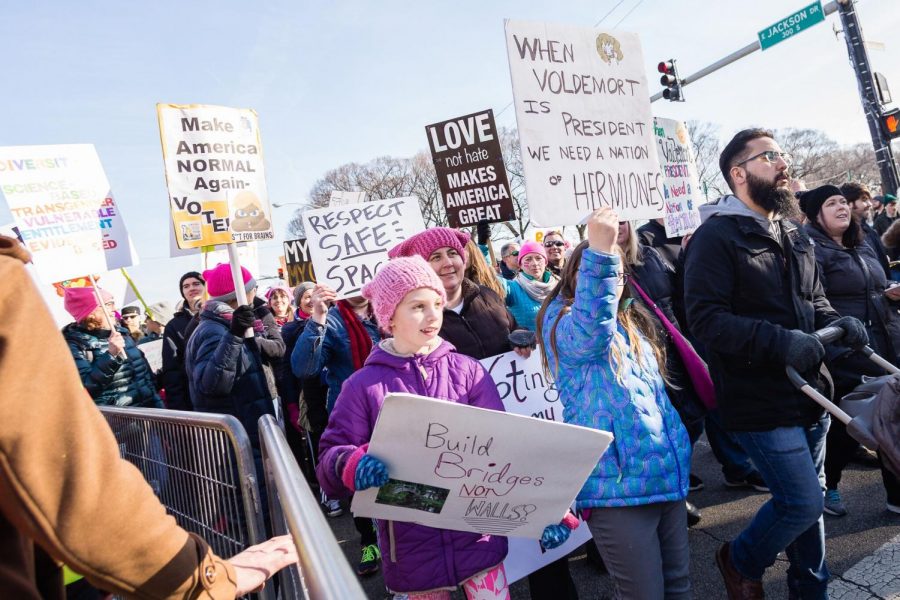From mom to activist: Women’s March board member reveals march experience
Courtesy Leni Manaa-Hoppenworth
Leni Manaa-Hoppenworth talks her experience of seeing women, men and children come together during the Women’s March to the Polls on Jan. 20.
January 26, 2018
Standing in a sea of people in the street, Leni Manaa-Hoppenworth, coordinator for Indivisible Illinois, a progressive activism group, was one of 300,000 in Chicago and millions of people nationwide who joined in the Jan. 20Women’s March. Manaa-Hoppenworth, who never participated in political activism before, became a key member in the Women’s March on Washington-Illinois Chapter on Jan. 21, 2017, the day after President Donald Trump’s inauguration.
The Chronicle spoke with Manaa-Hoppenworth about her experience and what is next for the Women’s March.
THE CHRONICLE: How did you get involved with the Women’s March?
LENI MANAA-HOPPENWORTH I was in front of my TV with my children [the night of the 2017 Presidential inauguration], just joking around and not realizing what was going to happen. The TV turned from blue to red and it was pretty devastating for me. I couldn’t function. I decided to jump on as a volunteer and I ended up getting onto the board of the Women’s March on Washington-Illinois Chapter. We organized logisticsand buses to D.C. We got 10,000 Illinoisans to go. It was an amazing time.
What was different about this year’s march compared to last year’s?Both of them were incredibly peaceful and joyous. You wouldn’t have expected that last year. This year, we were a bit more focused. Last year, out of the devastation we came together and it was amazing. It was incredibly inspiring to see so many folks turn out, folks who have never marched before. It was their first time, and [for] this year, a lot of people came out for a second time and brought their friends. I know in Chicago it was much bigger than it was last year. It was exactly the same: It was joyous. This year it is more focused [and] it was a definite goal to get everyone to vote. We need to keep repeating that mantra. We need to get more women at the table so that we can influence business and politics in our communities so we are more empowered.
What was most surprising about this year’s march?
I saw a lot of kids last year, but this year there were many kids and families. These kids hadsigns; they were standing up and chanting; it was really beautiful. Young boys [were there] too, it was really cool to see them engage.
Why is it important to introduce younger generations to peaceful protesting?
It is going to solve a lot of problems. I didn’t grow up talking about protesting or chanting, taxes, health care. In other countries, it is normal dinner table talk. We need to do a better job of having those conversations within our own families because those connections are the ones that are most important. We need to continue to talk to each other about these things so that we share our values and live our values together. I never talked politics with my friends and it is interesting to have conversations with them, with people that don’t necessarily agree.
Do you think the marches opened a gateway to other movements, such as Time’s Up or Me Too?
What a protest or a march does is a demonstration of solidarity and women are the majority. We need to present ourselves as not the exception, but the majority and we need our voices heard. We are not going to tolerate that anymore. I cannot change everything today, but what I do today is going to affect my kids and my kids’ kids. We know our voices are bigger and more powerful when we say the same thing and we say it together.
What are some other actions people can take to show solidarity?
It is a matter of having over-the-fence conversations with their neighbors. We need to understand that joining a Facebook group is a great first step, but moving on from there and having real face-to-face conversations with people and not being afraid to do that is going to make a difference in our future. A lot of people are realizing the power of actually looking at somebody in the eye and having a real conversation. Even with folks who don’t agree or learning to communicate with people who don’t really agree. Women bring a different set of skills to these leadership roles, and it is necessary to have our voices heard and represented at every table.
We are going to be working on getting people registered to vote and educating them about who is running [for office]. There is a big gap between people who actually register and who actually vote. From now until November that is going to be a focus of many groups in Chicago who are coalition partners with the women’s march.








